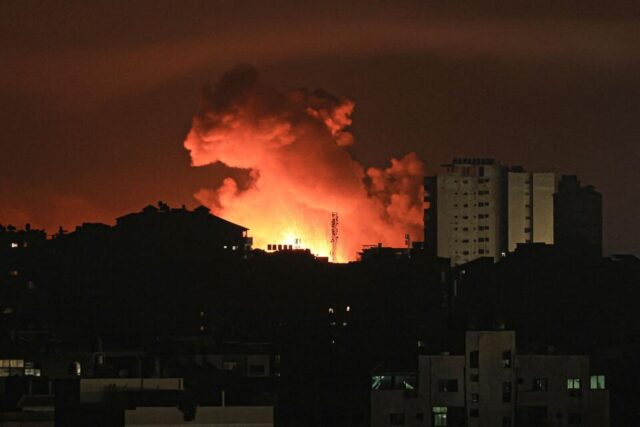The delay is another blow to families desperate to see their loved ones return home, and to two million-plus Gazans praying for an end to 47 days of war and deprivation.
ISRAEL said a four-day Gaza truce and hostage release will not start until Friday, delaying a breakthrough deal to pause the brutal war with Hamas.
National security adviser Tzachi Hanegbi indicated the phased release of at least 50 hostages in return for 150 Palestinian prisoners would still go ahead but not on Thursday as expected.
“The contacts on the release of our hostages are advancing and continuing constantly,” he said about the agreed deal to free mostly women and people aged 18 and under on both sides.
A second Israeli official said that a temporary halt in fighting would also not begin on Thursday as bombardment and combat again raged in northern Gaza.
The delay is another blow to families desperate to see their loved ones return home, and to two million-plus Gazans praying for an end to 47 days of war and deprivation.
The complex and carefully choreographed deal saw Israel and Hamas agree a four-day truce, during which at least 50 hostages taken in the Palestinian militant group’s attacks would be released in phases.
Hamas and other Palestinian gunmen seized around 240 hostages during unprecedented raids into Israel on October 7 which killed 1 200 people, most of them civilians, according to Israeli authorities.
The attack prompted a relentless Israeli campaign of bombing and a ground offensive in Hamas-run Gaza, whose authorities say it has killed more than 14 000 people, thousands of them children.
An Israeli government document said that, in a second phase, for every 10 additional hostages released, there would be an extra day’s “pause” in fighting. Three Americans, including three-year-old Abigail Mor Idan, were among those earmarked for release.
In turn, Israel would free at least 150 Palestinian women and young detainees and allow more humanitarian aid into the besieged coastal territory.
The hold-up came after weeks of talks involving Israel, Palestinian militant groups, Qatar, Egypt and the US.
Qatari foreign ministry spokesperson Majed Al-Ansari said on Thursday that implementation of the accord “continues and is going positively.”
In the meantime, Israel’s aerial bombardment continued overnight on targets in Khan Yunis, southern Gaza, sending red and yellow fireballs and immense columns of black smoke into the air.
Homes shook several kilometres away in Rafah. The agreement has been approved by Hamas leaders and by Israel, despite fierce opposition from some within Prime Minister Benjamin Netanyahu’s right-wing government. Netanyahu has backed the agreement with Hamas, but vowed the truce will be temporary and will not end the campaign to destroy Hamas.
Tensions rose on Israel’s northern border early on Thursday, after Hezbollah said five fighters, including the son of a senior lawmaker, had been killed.
Since the Israel-Hamas war began, the frontier between Lebanon and Israel has seen almost daily exchanges of fire, raising fears the Gaza war could fuel a region-wide conflagration. Israel’s army said Wednesday evening that it had struck a number of Hezbollah targets, including a militant “cell” and infrastructure.
The White House said President Joe Biden had spoken to Netanyahu and “emphasised the importance of maintaining calm along the Lebanese border as well as in the West Bank”.
US Central Command on Thursday said the destroyer USS Thomas Hudner in the Red Sea had “shot down multiple one-way attack drones launched from Huthi controlled areas in Yemen”, referencing the Iran-backed rebel group.
Israel’s list of eligible Palestinian prisoners included 123 detainees aged under 18 and 33 women.
Large parts of Gaza have been flattened by thousands of air strikes, and the territory faces shortages of food, water and fuel. In northern Gaza witnesses reporting strikes on Kamal Adwan hospital and nearby homes.
At Gaza’s biggest hospital, Al-Shifa, Israeli soldiers escorted journalists into a tunnel shaft they said was part of a vast underground network Hamas has used for military purposes, a claim Hamas denies. The army led reporters into below-ground facilities with air-conditioning units, a kitchen and bathrooms.
CAPE TIMES







